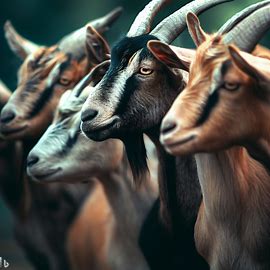Goats, with their diverse breeds and unique characteristics, never fail to capture our attention. Among these breeds, horned goats stand out for their distinctive appearance and intriguing history.
In this article, we delve into the world of goats with horns, exploring their various breeds, the purpose of their horns, and the cultural significance they hold. Whether you’re a goat enthusiast or simply curious, join us as we unravel the captivating story of these horned creatures.
The Fascinating World of Goats with Horns
Goats with horns have an undeniable allure that draws both admiration and curiosity. Their horned appearance sets them apart from their hornless counterparts, showcasing the beauty of nature’s diversity. These magnificent creatures have been an integral part of various cultures and ecosystems, leaving an indelible mark on history.
Different Types of Horned Goat Breeds
The world is home to numerous horned goat breeds, each with its own distinctive characteristics. From the majestic Spanish goat with its long, twisted horns to the striking Nubian goat known for its pendulous ears and curved horns, there’s a wide array of horned breeds to explore.
These breeds often exhibit traits that have developed over generations, adapting to their specific environments.
Evolutionary Purpose of Horns in Goats
The horns of goats have evolved over centuries, serving multiple purposes. They play a crucial role in defense, helping goats protect themselves from predators. Additionally, horns aid in establishing dominance within herds, determining the hierarchy and social structure. The intricate growth patterns of these horns provide insights into the animal’s health and vitality.
Cultural and Symbolic Significance of Horned Goats
Horned goats have held cultural and symbolic importance in various societies throughout history. In some cultures, they are associated with fertility and prosperity, while in others, they hold religious significance.
The symbolism of horns often varies, representing strength, courage, and connection to nature. Their presence in folklore and mythology further enriches their significance.
Raising and Caring for Horned Goats

Caring for goats requires special attention due to their unique physical traits. Proper handling and management of their horns are essential to ensure their well-being. Regular trimming and monitoring help prevent injuries and infections. Creating a safe and comfortable environment for these goats is crucial for their overall health and happiness.
Challenges and Considerations
Raising horned comes with its own set of challenges. Their horns can become entangled in fencing or vegetation, leading to potential injuries. Additionally, some breeds may exhibit aggressive behaviors, necessitating careful handling and socialization. Potential buyers and enthusiasts should be aware of these challenges before deciding to raise horned goats.
Breeding Practices and Horn Development
Breeding horned goats requires a comprehensive understanding of genetics. Breeders aim to produce offspring with desirable horn characteristics while ensuring the well-being of the animals. Horn development patterns can vary, with some breeds exhibiting more rapid growth than others. Breeding practices impact not only horn growth but also overall health and longevity.
Myths and Misconceptions about Horned Goats
Horned goats have often been subject to myths and misconceptions. Contrary to popular belief, not all horned goats are aggressive or dangerous. With proper care and handling, they can be gentle and friendly companions. Dispelling these misconceptions is essential to promoting a better understanding of horned goats and their unique qualities.
FAQs About Goats with Horns
Are horned goats more aggressive than hornless goats?
Horned goats can display aggression, but their behavior largely depends on factors such as breed, upbringing, and socialization.
Can I safely keep horned goats with other livestock?
Yes, it’s possible to keep horned goats with other livestock, but proper management and awareness of their horn-related behaviors are crucial.
Do horned goats require special care for their horns?
Yes, horned goats need regular horn maintenance to prevent entanglement and potential injuries. Trimming and monitoring are important aspects of their care routine.
What is the average lifespan of a horned goat?
The lifespan of a horned goat can vary based on breed, care, and genetics. Generally, they can live between 10 to 15 years or more.
How can I learn more about raising horned goats responsibly?
To learn more about responsible goat breeds keeping and management, you can access valuable resources from reputable agricultural and livestock organizations.
In the tapestry of nature, horned goats stand as a remarkable thread, woven with history, culture, and adaptability. These captivating creatures remind us of the intricate relationships between animals and humans, and the lessons they teach us about diversity and coexistence.
Whether as companions or symbols, goats with horns continue to inspire and captivate, reminding us of the beauty in all forms of life.
